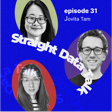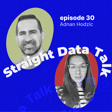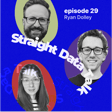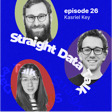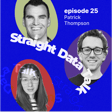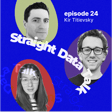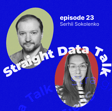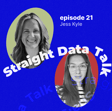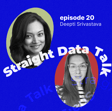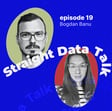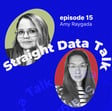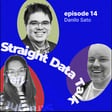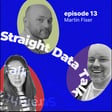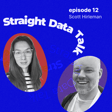Become a Creator today!Start creating today - Share your story with the world!
Start for free
00:00:00
00:00:01

Tiankai Feng – Inclusivity in Data Work in Practice
Tiankai Feng is Head of Data Strategy & Governance Services at Thoughtworks Europe. Tiankai joined us to discuss inclusivity in data teams, data work, and beyond. While it may sound vague and unclear, during the discussion, we actually tried to unfold what it really means. In essence, we emphasized empathy to understand what it takes to do data work and, conversely, what data teams need to understand from business stakeholders to deliver outcomes that truly matter.
Check out Tiankai's LinkedIn; he does a great job there!
Transcript
Introduction to 'Street Data Talk' Podcast
00:00:01
Speaker
Hi, I'm Hewlett Kachova, CEO and co-founder at Mesh for Data. Hi, I'm Scott Herlman. I'm a data industry analyst and consultant and the host of Data Mesh for You. We're launching a podcast called Street Data Talk and it's all about hype and data field and how this hype actually means the reality.
Podcast Goals: Sharing Real Stories
00:00:18
Speaker
We invite interesting guests who are first of all data practitioners to tell us their stories, how they are putting data into action and extracting value from it. But we also want to learn their wins and troubles as a matter of fact.
Format: Unscripted Conversations
00:00:33
Speaker
and as Elia said we're we're talking with these really interesting folks and that a lot of people don't necessarily have access to and that these awesome conversations are typically happening behind closed doors and so we want to take those wins and losses those those uh struggles as well as the big value that they're getting and bring those to light so that others can and can learn from those And we're going to work to kind of distill those down into those insights so that you can apply these amazing learnings from these really interesting and fun people and apply them to your own organizations to drive significant value from data. Yeah, so every conversation is not scripted in a very friendly and casual way. So yes, this is us.
Guest Introduction: Tien-Kai
00:01:18
Speaker
Hi, everyone. um It's Julia, and today we're happy to have ah as a guest, Tankai. And I'm very thrilled because I think he's one of the most genuine people out there on LinkedIn making his comments about data data ecosystem and data environment and still being able to be diplomatic enough, which is also very much appreciated by me. Yeah, but anyways, super thrilled to have you. Tien-Kai, please champion, introduce yourself and tell people who still for some reason don't know you. What do you do and what is your passion? Yeah, thanks a lot for the great introduction, Yulia. Happy to
Tien-Kai's Role and Passion for Human Aspect of Data
00:01:56
Speaker
be here. I'm Tien-Kai, right? I'm using my official job right now as being the data strategy and data governance lead at ThoughtWorks zero. I have a consultancy focusing on taken data topics with bespoke solutions. But I'm very passionate about the human set of data as well.
00:02:10
Speaker
And this is something that I love to talk about. And I'm very happy to talk to you to YouTube today about this as well. And more from an inclusion point of view. So yeah, happy to talk to you. ah Yeah, super exciting. So listening to you kind of during the prep call. You mentioned that you want to be talking about inclusivity in data. And I was quite perplexed. What does it even mean? Am I missing some topic out there? So what do you imply when you say inclusivity in data? Yes.
Misconceptions and Inclusivity in Data
00:02:39
Speaker
um I think that in today's day and age, right, this um data has become ah this topic that has a lot of misconceptions by the ones not working in data.
00:02:49
Speaker
And the reason for that, I think, being is that, first of all, data people are very proud of their jobs. So and they make it usually sound like it's something that nobody else can do ah very often. Just like, I solved this super complex data problem, and I'm distressed, right? But the other side of it is also that and we are pushing for these topics like data literacy or data cultures, but always from a data team-centered point of view, and not so much from a non-data team-centered point of view. But they are the ones who might be afraid or very lacking competence, so to say, to actually get more into data. And combining those two means that I feel like the data is a field that can be more inclusive and should be perceived as a more approachable area. So we actually get people more involved. And we need that cross-functional collaboration anyway, as we established in many disciplines like
00:03:33
Speaker
data governance or data analytics and self-service and all these topics, right? But the first step is to change minds, I think, for for people that are not working in data to see data as a field that they can get him into and where they are motivated to get into without being afraid. And this is what I mean with inclusion.
Challenges of Teaching Data to Non-Experts
00:03:51
Speaker
One quick question I would have there is, do you think data people are afraid if they bring other people in that they're going to lose their power or their jobs? like what Why do you think this becomes a a problem sometimes so on the data side as well, like the data people side? ah I don't think that they are afraid of the power shifting. I guess it's more about data people not by nature knowing that they have to be teachers as well, almost. as in that if you want to bring people in, it's not only about I'm throwing you over a dashboard, now you get to use it, and I'm done, self-service, this is how it says on the paper, so you you do your self-service now. But you have to guide them to, right? Like, click around here, look, nothing nothing serious is gonna happen, just filter it around, and check the data out, I help you interpret it a little bit.
00:04:35
Speaker
And then now you get to understand it yourself a bit more, and then slowly let it go, and then actually your stakeholders can use it on their own, right? But that whole phase of it's not about only creating the dashboard and throwing it over, but for example, it's actually about guiding them to use it and giving them the confidence to use it, and making it their day to day. It's completely underestimated, I would say, right? So it's like, how do do we define our work in data teams? And if we only define it as in throwing things over, and then we move on to the next one, then it looks like that we're not really including other people, right? So we are just like the experts that are throwing things out, basically.
00:05:07
Speaker
That is interesting to me because what I think that data engineers tend to think of themselves as software engineers. And all of the job that you mentioned basically to get users on board to do you know um quality and quantitative checks of how the product have been used. This is not this what software software engineers do. This is what product managers do. you know Maybe even business analysts, whatever. And here we have data engineers and what she was saying and whatever what I'm hearing, right? um You expect them to do the end-to-end job, basically, to collect the requirements and decide what needs to be done. Do the architecture, last to that, do the whole though i wass job with a provision, you it was you know, with ensuring the entire system works. And last to that, at the end of the day, you want them to go
00:06:02
Speaker
take a hand of the user and ask him politely, do you like it? yes How do you get to use it? Is that working for you? Like, isn't it too much? I
Importance of Product Thinking in Data
00:06:13
Speaker
don't think it's too much. I think it's maybe what you describe as actually product thinking, right? And that is exactly what it is, right? So, I mean, we talk a lot about data products and data metrics, of course, but I think besides the whole technical aspect of product thinking, the human aspect of product thinking is equally important, right? Because if you're actually a product company, you want to sell it to people, you don't just put it out there and hope that people buy it, right? You have to market it. You think about what it's being used for. You will do some user research about if they like their product or not, right?
00:06:40
Speaker
you ensure that you get loyalty, et cetera, et cetera, all these points. You write instructional documents, and manual on manuals, right, into a product packages for them to use it in the right way. All of that is happening, right? So I i don't know, like it might sound a lot, but at the same time, I think product thinking itself is ensuring that what they're doing is impactful too, right? And so I would say that is not a waste of effort. It's more of a changing your mindset um to make the market well of it Well, with Yulia's, what Yulia was just saying was, we don't have to do all of that in software. Are we setting are we setting ourselves up for for failure in data? If we try and lump that all on one person instead of having people like product management, like Yulia is a product manager background in data versus are we setting ourselves up if we go, okay, now data people, you now have to do these 10 actions. And are people just gonna leave? yeah And then we have to give them the time to develop this. So like, how do you think about
00:07:40
Speaker
an organization starting from this historical like standardized setup to actually heading in that inclusive direction, is that just everybody has to do 10x more work or different work? or ah you know Because we also have this problem of so many data things that we do that just aren't useful that don't get used. So maybe if we're just focusing on the thing that's useful and get used, maybe we don't have a ton of extra work. But like how do you think about that that organizational setup so you can have inclusion.
Roles Supporting Inclusivity in Data
00:08:12
Speaker
Yes, and I do think just like we have um often now DEI representatives and people that are leading DEI efforts in overarching topics, right? Having more of that softer element as a mandate for certain people and in an organization for data topics
00:08:28
Speaker
would definitely be useful. And I think, I mean, you bring up a rubber really the point like data product managers obviously have a really important role to play. um They would be a grand translation layer between like the the more non data side with the data side, right? But I also feel like that um newer roles such as like data cultural managers or data literacy managers, right? They can have really an impact like this if they like but actually are dedicated to this kind of effort and to help to basically empower all the data efforts to be taken seriously from that note as well. I have a point. So again, as I'm coming from a product management background, well, it's also very confusing when let's say we have a product manager, project manager, business analyst, software engineer, and, you know, multi-test specialist, like we have a theater of people working kind of to deliver the product. And then, then sometimes accountability and ownership can get lost.
00:09:27
Speaker
So how, like, and and and and listen, Tanka, I think I'm a big proponent of product thinking for every single person in the organization, not just data engineers exclusively. Like I want everyone to take, ah you know, ownership and like accountability about what they are doing. But well, if we add more people, Potentially, you know it can not necessarily create more value, but create more, how do you say it's like blurred responsibilities, like gray areas between people. It it's also has some risks. What do you think about it?
Successful Inclusive Practices in Regulated Industries
00:10:05
Speaker
ah That's a great question, but I would say um when we talk about additional roles to make data more inclusive, to go back to the original question, right? I'm not saying that we're shifting accountability and responsibilities away from what people have been doing already, right? I would rather say that the new roles and um new mandates are in acres for the ones ah to be better in fulfilling their accountability and responsibilities this way around. right so and in In any organization, you always have for more enabling functions and more value ah driving functions. right And if we think about it from a data organization point of view, I think you can have a similar way. Those data culture or data literacy managers might have different measures of success and they would be measured by different things than data engineers, for example. But that can be established. right like what what How do we define success for them?
00:10:54
Speaker
Ideally, it should be rooted in some kind of human feedback or some kind of aspect that is actually related to the human side of it, right? um But yeah, I think that is possible. Oh, wow. Oh, we lost you for a sec. Oh, we're back. We're back. Good. Okay. Okay. Okay. That was interesting. Okay. I think I have a question. So did you see the organization, the example of organization where these roles ah were actually successfully introduced and ah you know they made some, they how do you say they made some progress with this kind of people?
00:11:28
Speaker
Yeah. um Yeah. I've seen that in, ah especially I would say regulated ah industries and of companies where there's no way around to be more data literate, right? So in the end, um not being good in data could lead to serious consequences like fines or like jail time, even, right, in the worst case. So the motivation is normally already high for those companies to be better and ah being diligent about data. ah So they actually act as enablers, basically taking offload from, let's say, and analytics engineers to data engineers, explaining how it should work to business users. This is exactly it. And then it it usually is a mix of um like being an upscaling function as well as a communication function, right? So it's equally as much about ah teaching people to understand data concepts, to understand how data works in the company.
00:12:19
Speaker
as well as ah basically communicating on why it's important to make more awareness about it, um to ah create more awareness around data initiatives and how that all ties into business outcomes, et cetera, et cetera. But it's it's kind of that hybrid functionality that um makes it work. Okay. So, you know, just for the audience and for me as well, I'm interested in the profile of this company. Can you please, um, on board? Because, you know, for the startup and even for mid-size and enterprise organization, I don't think that the data cultural managers are a necessity. So what is the organization's ah size industries and and few use cases, like that would be very helpful.
00:12:59
Speaker
Sure. I mean, I have in mind a pharmaceutical company that's globally active and a financial services company that's globally active as well. And it's because exactly of that, I would say being an internationally operating company, you have ah the global versus local um challenge of like global um guidelines, but local legislations and regulations. Right. and But also you have that very diverse set of people working on data because you you have most likely local counterparts, your global counterparts as well. Right. and So um yeah, again, having said right, um both on both times, it was driven by regulations rather, because they had to face what to do, be transparent, be consistent, but be able to be auditing as well. And that kind of tied into all of the efforts to make it work.
00:13:43
Speaker
Okay, so do you think that help this role helps to actually create the real data governance in organizations? Because what you mentioned previously, they have no choice but to make it happen. and like Do you see that as an enabler and how much would you, let's say, allocate in a percentage-wise of improving their data governance? so I don't know like how much it helps to actually get data governance right. Yes, I mean, generally, I think regulated companies and always have data governance, at least on paper, right? um They might do it in different ways, but they have to do it, right? I think at least this is the consensus that if you are heavily regulated, you need to have governance mechanisms in place and the right role responsibilities to do it.
00:14:28
Speaker
um I think it's then more of a, I would almost say, the preference or the culture of the company to be more um conservative or um forward-looking, I would say, as well, because often with the regulated companies, you also have existed a lot of ah a long time as well, right? um So if you're rather just ah protecting the as-is, or if you're rather forward forward-looking to think, okay, if we would do AI stuff, for example, are we were ready for it, then how would we then change our governance towards to make them already? And then you have like a really different approach to it, right? One is like the keeping the status quo alive and to ensure we're just protected at all times. And the other is how can we put guardrails on innovation, basically, right? so ah So if you're thinking about this, especially maybe not at one of those larger companies.
00:15:13
Speaker
ah Do you see this as a role or responsibility? like How do you think about somebody getting started with their focus being on cultural change? Because a lot of times people aren't going to be able... you know If you've got in a data organization, if you've got 300, 400, 500 headcount, yeah, maybe you might be able to get ah a role that's hiring them. But if you talk about like a scale up or you know these smaller companies that have a data team of seven people, their eighth hire isn't going to be a data cultural person because that that's not going to fly with war. so like How do you think about that incremental getting started? I use this phrase a lot of nobody should do data governance. And data governance people kind of look at me like, where is this going? Because they know me well enough to know that I'm not going to say data governance itself doesn't matter. But we lump all of these things in data governance under, it's everything that isn't
00:16:08
Speaker
data engineering or BI or certain reporting functions and a couple of different things. We lump it under governance and it's this kind of other team and it's 10% of the team in in kind of organizations that are aggressive about doing good governance and yet it's everything else. so like How do you think about, you know, say somebody is listening and going, yeah, I want to do this inclusion stuff because I think it's important. I want to, I want to have data work propagate through the rest of the organization, leverage that the work that we're actually doing.
00:16:40
Speaker
But like how does it get going? in And one of the reasons that I'm really asking this as well is like I talked with Benny Benford, who was the CDO at Jaguar Land Rover previously. And he was talking about like our first year. We just did this stuff on the budget of what we were already doing. And then the next year, we could have gotten budget, but it was a weird you know financial year. So we didn't get budget. And then year three, we already had a bunch of proof points. And then we got budget. So like how do you think about, especially when data people want this to get done? you You bring this up and you're like, this is our initiative. I want to get it done in three months. versus building for the long term to be inclusive as an organization. So 18 different things to kind of avenues to to talk about there, but like, how do you think about getting that going, getting started for an organization that wants to be more inclusive?
Improving Inclusivity on a Budget
00:17:24
Speaker
Um, very good question. I mean, I would say the following first that, um, you don't have to have like a super well thought out long-term plan about data culture or like inclusivity and data, right? I think even without any budget, everybody can change the behavior a little bit to start being better at it very simply. Right. And it's really just about every data person in that seven person team to be a bit more reflected about, has I been inclusive enough every day? And have I really ah been, um, like. helping my stakeholders as far as I could or was I just doing a to-do list and checking the boxes and it wasn't really that good that I did.
00:17:55
Speaker
And then you just might get a little bit better, right? So just be spend a little bit more time guiding a stakeholder, spend a little bit more time understanding their pain points and their fears and just addressing it, right? And over time, you might think that might be, there are bigger issues that need to be tackled, you need like a whole initiative around it, the bigger company grows, and then you might need budgets, but at least you have a feeling of where it needs to go, right? And you know where the problems come from and what the value of it is. um I think usually, right, to even be able to hire like, um a data culture or like a data literacy person, of course you need to be of a certain size. Because everything below that, you're anyway doing well things on the fly and like everything is changing very often, so you do it kind of more democratically. and But that itself is a great way because it's while companies, everybody knows each other as well. And you don't have that anonymity problem of a big company where you don't even know who to talk to, right? So you just yeah you know who to talk to and you can easily just address it as well.
00:18:49
Speaker
ah Tim Cai, I'm trying to understand if a Mike is working or not. What is, you know, ah like just in my reflection on that. So we actually, you know, but for the past two years, right, we were in high interest rates where VCs stop, you know, investing in lots of organizations. So they needed to, the organization eventually needed to cut their budgets and they were cutting on the departments who couldn't justify their internal investment.
00:19:23
Speaker
think There were a few big layoffs all over um know over the yeah industry. My point, and I think it's but what you're saying is also ability to justify return on investment as well. like Because you deliver the product in the end of the day, we can call it a fancy as a data product, or we can call it a simple as report. Just a dashboard. But my point is, what you're saying to me is actually very reasonable. You just need turn to understand if that's going to be used and if it's going to create some value while just you know writing down the model because this is what you learn to do rather than going out of your shell and making sure that things work for the business.
00:20:18
Speaker
And this is, I think, the one of the reasons why these data departments were exploded a little bit, you know, because it was nice to become a data scientist. Or, you know, if you knew something beyond SQL and, you know, a little bit of Spark or whatever, you kind of could get a better job. I'm not, I'm not blaming for that. What I'm trying to say is that the outcome matters and sometimes I totally agree with you. Listen, it's like I'm big proponent of for product thinking. I just think that data teams do not realize that they are there to serve and to bring value to organizations rather than to do the job in terms of rising SQL or DPT model.
00:21:08
Speaker
Absolutely. and um Yeah, I would say actually that once you, i so um I would say that data not being inclusive enough is probably, am I had more of a root cause than a symptom, if that makes sense, right? So what I'm saying with that is that the symptom would be that the data team is worked doing a lot, but someone else gets adopted. And you might wonder why that is, right? So everything is great. It looks like we've created all of the right data products and all the right dashboards and all the right pipelines. And why is it not having any impact, right? And one of the reasons could be that it's a human problem, right? And it might be that there's really just a clash between the business user side and the data teams. And it's rooted back in not being inclusive enough, right? As in that the data team had for a long time just the habits of throwing things over, not really asking for feedback, not really guiding.
00:21:59
Speaker
and the business you just got used to not providing any feedback anymore and instead just not using it and do the whole thing instead. So I think that links to the return on investment question that you had. and I would say that we should just consider the human side of data teams and the inclusivity of data teams as one of the things to look at where we cannot identify where the problem comes from. Where it might have been really a mindset and an operating model question that it didn't work. And that should be just considered. And I have a feeling that a lot of companies that that part could be improved because it usually doesn't appear very often on like strategic documents as I will write to be a bit better in terms of stakeholder actions. It just set stands there. We should improve our data culture and increase data literacy. But it doesn't say really that we should treat each other more nicely and empathetically as well or something like that.
Fostering Inclusivity through Open Conversations
00:22:47
Speaker
man so how do you is i mean kind of You talked about DEI, diversity, equity, and inclusion earlier. In this more recent environment, we've seen a bunch of companies, even though there's plenty of evidence that DEI creates better outcomes, we've seen plenty of companies cut DEI because it's not traditionally thought of as, um you know it's it's from my perspective, it's the right thing to do and it's the smart thing to do, and yet we've got people that are refusing to do it. And so you know data has kind of in this old old school version of thinking where there's a lot of people that are still in this super data warehouse um thinking of, I do the data work. You get to consume what I tell you. You get to consume. But I do the data work. And now we're trying to say this like more empathetic, more yeah integrated, more inclusive in both terms of like making the data.
00:23:42
Speaker
um usable and and like including those people in the discussions, but also like kind of including it and and integrating it more into the actual work of the day-to-day work of the organization. so like how are in this kind of environment, do you have any any things where you you talked about you know what can people do on the almost on the individual level? It may be a little bit of checklist, but how you can bring this conversation up. And and even if the answer is now we haven't found oh you haven't seen enough where it's actually where people adopt it, that's fine. But like how if if somebody isn't the leader of their data organization, how can they start to have this conversation up?
00:24:22
Speaker
we need to be more inclusive instead of we need to do better data work because that's been the thing. and and you know It's the definition of insanity of focusing so much on the data work when the we're not seeing adoption anyway. Okay, what's that going to bring you? but like Thinking about the like the actual conversation that people can have if they're bought into what you're saying, which I think they should be because so much of this is like, if if you're doing data work for the sake of data work, you're not driving value versus how can the actual organization leverage this and drive value from it at the organizational level.
00:24:59
Speaker
Yes, absolutely. And I think, though, that the the main action to take, um which is a simple one, but a scary one, is just to start an open and honest conversation. right to every simply board like The data people that are working day to day with their operational stakeholders. right and ask for feedback very simply, right? So how do you think our collaboration is going? Do you feel like what I'm doing is clear to you? um How do you feel about using what I'm trying to work with you on? What is um like holding you back on using it? Tell me what but your fears are or tell me what is holding you back for example, right? And and alone that comfort alone that conversation itself probably already opens up the field, right? It's like all of a sudden the data people, the data person is not just giving me something else, what they work on, but they're actually caring about what I think.
00:25:43
Speaker
and caring about um how I can work with that person, and that itself is an act of intuitive to the day. And I think this is something everybody can do. I know it's scary, especially when you never ask for feedback, and then you know it's not going well, and then you have to ask for the feedback, and you will definitely get some negative, but hopefully constructive feedback, but it can only get better from there. right So um just on a compensation level, to be a bit more open and honest, I think can be a great thing. Yeah, and I think that that makes a lot of sense. you ah so like As as again again, in my career where they practice with software engineers, when I would get a great feedback from our users, I would get back to them and show yeah yeah just showing them what kind of impact they're creating, like how does somebody's life
00:26:29
Speaker
I guess we are, you know, especially data engineers who do believe they are very much separated from the results what they are providing. Like they serve horizontally to the entire organization. Like there is a lot of outcome created by them, right? But ah they still needed to be kim communicated how they help. So it's also a form of feedback, but I would highly encourage every other you know, businessperson, consumer of data to keep it, to find the ways to give feedback for their data engineering team. So it's sort of, say, um the dialogue, not necessarily, you know, a one-way ah conversation. Yeah. Absolutely. I totally agree. So we're getting boring, right? It's like getting bored here, right? ah But what? I'm super reflected and deeply thinking I'm not bored.
00:27:25
Speaker
but um It's good to know. It's good to know. I was expecting this conversation to be all loves, music, you know enjoyment, and we're like, okay, we need to take care of our mental health and just calm down. But the topic that needs to be treated seriously, I would say, right? It's not a would be ridiculous matter. It's ah it's a good matter to think about. And we have positive energy. It's not like we're talking negatively about it either. Right. So I think it's so. So a lot of what we're talking about here is so I've talked about this somewhat of making data more approachable. It's it's.
00:27:58
Speaker
Um, lowering the bar to, um, that, that people have to clear to get towards the data, but it's also raising their capabilities. How much of this inclusion do you think is going out there and actually talking to those people and being like, and, and upping their capabilities? Because if all we're doing is, you know, I know this is not the right term because it's again, that's non-inclusive term, but dumbing the data down at some point, you do start to lose that incremental value of. the data work and what you're delivering because your you're making it, you're you're summing it up too much, you're you're you're kind of doing that, I don't know if you, ELI5, explain it to me like I'm i'm five. um And so, ah like, how do you think about upping people's capabilities so that they can actually feel comfortable coming to the table and having these conversations? Because a lot of times,
00:28:54
Speaker
part of the reason why data isn't used, it's not that it's not just approachable, it's that those people don't feel like they can't approach. And it's not just because the scary data people, um yes, there are some scary data people out there, but like how do you think? Yulia being one of the scary data people, the the the school of Mars. Well, Riddia established that you're a beautiful one here, and I'm the scared one. is yeah um yeah and I would say that actually um simplifying things to a certain level is a good starting point, but the good thing about it is that once the stakeholders get comfortable with the simplified version, they are more receptive to the gradually more complicated
Enhancing Stakeholder Capabilities
00:29:32
Speaker
versions afterward.
00:29:32
Speaker
right But it's normal. Exactly. And then this is the learning curve. Exactly. So I'd rather see it as like a beginning of a journey to dumb it down and your quotation marks here and for those who that are listening. and buts i know But over time you can ah smarten it up again, right? And basically um at some point reach a level where it's actually a good balance ah between um basic business expertise and extended capabilities and data people still being valuable. but yeah Well, you know, my opinion i on that is that we have enough tools out there to make it up to any level.
00:30:07
Speaker
like Luckily enough, we have so many solutions. You know you can do it natively by capabilities and every cloud, you can you know have relatively cheap solution to visualize whatever. That shouldn't be a hurdle, I guess. we with like No, it's I think what is more important if ah yeah users want to use and to collaborate with you as well on refining the results. you know And it's again, it's two ways conversation like they need to give you feedback, they need to be willing to have the data product.
00:30:45
Speaker
to do their work better and data engineers should be interested, or not data chips, but data teams should be interested to improve it and refine it over time because nothing is done and still it's always moving, it's always improving. Yeah, it's not like you ship this dashboard and you're done. The task is done. Yeah, we're free to go, but no, in reality it's not. Absolutely. Yes.
00:31:11
Speaker
So again, like, uh, I'm wondering, how do you think about like, when, when you're talking to a data leader, let's say, again, let's say somebody out there is lead listening that isn't the data leader. How, how do you think about having that conversation internally of we're having these problems, right? Like of, Hey, I think this is not, this is not where we're, because from my perspective, it's, it's kind of funny because, you know, the reason why we're We're having this conversation is that most people aren't doing inclusive, ah you know, in yeah aren't really headed in this direction. But I think the second you bring it up, it's kind of like, yeah, that's kind of obvious that we should be doing that, but we're not. And I don't know how to fix it. And it's, it's kind of like.
00:31:55
Speaker
We're, I think we've, we've talked around this a lot, but I think it's also like when you tell somebody that's, that's, you know, struggling with weight or whatever that you should eat better and you should exercise and you're just like, okay, but like, how do I actually integrate that into my actual existence? How do you do like, how are you thinking about like having that, that internal assessment of, is this our actual problem? Because you I have this with data mesh where where it's not as bad now, but a bunch of people are like, yeah, we should do data mesh. And it's like, you've got a data team of six people that shouldn't do data mesh. like This is way too much overhead to take on. But like how do you think about
00:32:34
Speaker
getting the data people to assess whether this is their actual problem. When again, most people didn't get into data work to deal with people. They kind of got into data work. yeah we don't have to date it's kind of It's kind of like when you talk to people that are in accounting and they're like, I got into accounting so I didn't have to deal with people. And then the more senior you go at all, um you know, it's like, it's 90% people work and it's 10% of the accounting and actual like math work stuff. So. Exactly. Yeah, it's ah it's a great question. And I think I would actually not do it as like a regular assessment of how inclusive a team is. I don't think that's going to go well, because it's very subjective too, right? And are you literate or are you illiterate versus thing are are you inclusive or not inclusive? Like, exactly. I'm inclusive, right? Yeah. no but I would rely on your line.
00:33:23
Speaker
like Exactly. Now, i I would rather say that I would bring it up when there is a problem um that is a business problem, and it might be one of the root causes of that problem. This is what I would bring it up, right? So let's say we're addressing a project that's not going well, somehow the communication is not working well, and then ideally someone can bring up, well, are we really working in the right way with our stakeholders? um Do we know what their paperboards actually are? Do we know what they care about? um Has anyone ever wondered and kind of go go there on that level, right? And do you want me to tell you a case? So I just reflect on all our conversation and I know the case very like insider case. I'm not going to mention the organization, whatever. So, uh, their data platform and all the processes were built by, um, like a very early employees. Let's put it this way.
00:34:12
Speaker
right They moved and progressed in their are careers in the same organization, and they hired people to take corporate with them, right the data platform and all the data processes. ah But they were really using our data techniques. they They work well, but still it's very hard to maintain. They are breaking openly. and What need to happen need to be a kind of a little bit rebuilt. Some pieces need to be thrown away and and everything. But this now, this suit is very attached to what they built. Got it.
00:34:46
Speaker
Like, but the person was actually hired, you know, to make things right. And there is so much friction. And I'm not sure, it still sounds to me about the inclusivity, you know, and im letting go the baby. But yeah, how do you think about this? Because yeah it's a very controversial controversial case. I think so, but at the same time, it feels like that the C-level people didn't get why it needed to change. right so i I get why people don't like change generally. right um If yeah something works for you, then you don't want to change your running system. right But yes if they have not been made aware of what the problems of the old solution were were and how that actually the overall business benefits from that change,
00:35:28
Speaker
then they're not motivated to change either. right So one way or another, there was definitely some communication problem in that specific case. right so um But what's funny is that somebody got hired to replace something that they still ever care about, but ah they weren't aware of why the people that person was hired apparently then in the first space because otherwise they would have signed up on it, right? and But it does sound like they were then surprised that, oh, wait, that person actually is doing something that I don't want. ah why Why would I do that? So in the many ways, there have been some kind of backup communication in all of that. um And again, that is kind of a, we don't know why that communication didn't happen. Was it politics? Was it ah thinking it's too much work to be communicative or not? But ah either way, some more empathy and some more understanding who's involved and what they care about would have helped, I think. So
00:36:16
Speaker
If somebody is looking to establish an inclusion program, what what do you think are the most important steps in
Steps for Creating Inclusive Data Environments
00:36:26
Speaker
that? Is it big workshops? Is it like one-on-one communication? is it Is it that you train the data people first before you go out there and say, we're now going to include you more? like How do you think about what does And maybe you know you can you' you've been working probably with more larger organizations. So you could talk about that, but then we can speculate a little bit about the smaller organizations. But like you know and and one again, from talking with people do doing data mesh, they're like, yesterday we weren't doing data mesh. Today we are. And it's like, that's not really how product thinking works. That's not how incremental value works. But like how do you think about kind of moving forward on that?
00:37:08
Speaker
is it Is it more grand, broad strokes that, you know, kind of, and it's kind of like, are you painting a wall? Are you painting the full wall? Are you putting down a coat on the wall? Or are you painting like some finer features on the wall because you're doing something, you know, you're painting an actual painting, you know, some a mural or something on the wall? Like, how do you think about those, the the first steps as to where, you know, step zero is kind of assess where you are. Step 0.5 is kind of start to have conversations about where you are. And then step one would be.
00:37:43
Speaker
Got it. Yes. The first thing is, I don't and they haven't made back the greatest difference with any inclusion-related programs, to be honest, because in the end, they always feel forced, right? And it kind of defeats the purpose of inclusion, of just forcing everyone to go through the same trainings at some point, right? um But this having said, um I also wouldn't tackle that this way, right? To force trainings on everyone and just kind of make sure everybody gets now full-blown eight hours training on inclusion. I would rather to see it as, ah let's have a safe space of reflecting on how inclusive we were so far as a small team of of data people, right? and Let's be honest about where we might have lacked in the past and where we think like this might have been not not a good choice of how to act or how to communicate. And everyone themselves creates like, um I would say, their own commitments and ought to be better.
00:38:31
Speaker
And those commitments, they can be accounted for right by their, whatever they have as their plans of 90 day plans or have your plans or objectives of the quarter of five performances matter, but make it part of it, right. Commit to it officially and then try progress with your manager on it and and do it rather personally. but then have it maybe on like a forum maybe once per six months or something and talk about it, like what we learned, what worked, and how it makes progress, et cetera. So you've seen a little bit that sensitive personal space where we want you to think about it, how they want to do it best on their own, but you have a forum for cross-communication to also exchange on it. This is what I would do.
00:39:09
Speaker
That is really interesting because what you described remain it reminded me of retrospective, like sprint retrospective that we're used to have ah like with the team and just sharing the experience of that. Sometimes it was hard to have those, like you need to be you know in a certain vibe, the team need to be on a certain vibe. as You know, I think it's very much what you're trying to convey here is like, why dealing with people? And before doing business with them, we need to build up the communication and, you know, like it channels you know those people to make things work. So it's not necessarily a hand holding, like we need to understand the boundaries of other of other co-workers, whoever teammate.
00:39:57
Speaker
You know, just ah be, am I, am I understanding you correctly? Just go a little bit beyond the professional way, like yeah have to know the person you're working with. Exactly. Yeah. To build that relationship with the same team and and, you know, build the culture, not necessarily the data culture, but some culture. Yeah, I mean, it depends on how you define professionalism, but um I'm thinking to apply empathy um is still counting as professional, right? I'm not saying you should go drink a beer with every stakeholder all of a sudden and force to spend time with them outside of working hours, right? It's more about how to infuse a little bit more empathy into the day to day.
00:40:35
Speaker
It's just getting to know the people you're working with. so fact doesn't yeah it's It's not like you have to have a mirror with those other people. he just You just need to know, ah hello, how are you? Yeah, I see. It makes sense. yeah Yeah, I think this has been more, i like Yulia said, I think in the pre-call, we were all jokes and and jabs, but I think this is more introspective because it is it is hard to think about, yeah, I mean, relationship management, when you think about like, is it all about the fun? And it's like, no, it's about like,
00:41:06
Speaker
figuring out how you compromise and work together and bring yourselves together. You think about like what what makes a successful relationship. It's checking in with each other and being respectful, but like also understanding that that person may not be on the safe same wavelength.
Broader Benefits of Inclusivity in Data
00:41:19
Speaker
And how do you get them out of you? I mean, you know you don't want to think quite as transactional probably in your personal relationship, but how do you bring value to each other? How do you bring value to each other's lives so that you're you're doing it in that perspective? So yeah, it it is it's one of those kind of funny topics, but also like introspective because it is there's so much there that you want to ah to have things go. ah you You want to be thinking in a long-term approach, but also in a like, hey, we don't have to get this right right now, but we want to just continually be better.
00:41:52
Speaker
so yeah i said And at one thing I think why it's also so probably hard for data people is it's because it's so the opposite of analytical too, right? Because um you cannot really never define the exact right and exact wrong. When it comes to human relationships, it's always just as good as you can, right? Like, um and just find your way. So I know how it can be really scary for data people to just not know what exactly the right road is to take and try to find it out. um So yeah. Listen, with data, it's also, you know, especially with, let's say data quality, when we we cannot make it 100% quality to data, we just can agree on some level, you know, we're having it too liable. So this is really interesting to me, because what you're trying to say, um ah you know, built on this inclusivity in teams.
00:42:38
Speaker
being just respectful and built in sort of a normal environment mo around itself. But for me, it's also when it comes to data people, it's also given, I don't know what a transit word. Like how is what you produce with your pipelines is being used. Because like what what we see ah in our work, that there are so many tables that have upstream compute, meaning have a bunch of DPT models, yeah know data for, and scripts wherever, and not ah it'll basically end up in a warehouse. And there is no downstream usage, no dashboards, no ah users logging in from the console to query those tables. Now we tell folks, they just sit in data warehouse and consume compute.
00:43:35
Speaker
That's it. And this is like such a waste, not to mention that about dashboards, like we're not even going there. Of course. And I think, I really think that need that what what what what distinguished a good data person from a great one is understanding how their job being used, how they improved somebody's life, not life, but work, like not shoot for life, how much that cost also. Yeah. I do think about it, and it creates a space of accountability and leadership, and this is where we can actually build a basis also for data governance and and solid data culture. Absolutely. level What is happening? Good to me. I'm so smart. Yeah. so Scott, you're being beautiful and I'm being smart, okay?
00:44:24
Speaker
But maybe also to put the cherry on top of your cake that you just built, I would say, right, if you, uh, measure your own success as somebody who wants you to do an organization a little bit differently and don't go beyond that is producing output, but rather the outcome right off how it actually being used in price value on a human level two, then you already have a great starting point, right? Because, um, then you actually have it as an objective or yourself to be better at this. And I think this is how everyone can get it started to be one. and And you get better proof points for when you're talking about the value you're delivering to the organization, so you can get more budgets. I mean, it actually a a whole understanding that yeah it's understanding the organization and how you get it. The organization doesn't value data work. They value the outcome of what came from your data.
00:45:09
Speaker
So I think it's a great place to wrap. Potentially. Yeah. Potentially. Okay. Well, first of all, Dinka, thank you so much for joining us. I was hoping to have some songs, jokes, you know, maybe a few memes. No, it didn't happen. Instead, we had such a meaningful and reflective conversation, which we appreciate so much. I don't think we would be able to to have any of those. Yeah, absolutely. It was a great pleasure to be here. um i so I am in a mood to write a sad ballad now after what we just talked about, but maybe you do that the next time. Yeah, I was going to say, definitely a minor key. That way you get a new feeling. No, I was yeah like...
00:45:50
Speaker
ah so what i When I met you first time, you know I highlighted with the high energy person, go and I was so excited, like, okay, we're going to storm it. Instead, ah like you open up to me from a completely different side, which is I appreciate you so much for that. you know We've been so genuine here and I love it. so It's like a therapy session that everyone out there i can listen to. know yeah i mean I'm glad that I can show my other side too of not just being high energy and making jokes all the time. I think it's a win-win. it's yeah ok I mean, this stuff matters, right? like This really does matter at the end of the day. like making this Making data approachable for other people can change but can honestly change their lives because it can change significant parts of their career. It can give them a lot more confidence. It can do that. so like It's important, and as data people, us connecting with other people instead of just other data people or just connecting with the ah the tools that we're using is yes it valuable.
00:46:45
Speaker
And you know what? Also, I think it can lower down the rate of burnouts. teams i'm ki Yeah. Communicating, getting feedback and actually feeling yourself included also in a bigger picture. Letters. Oh gosh, I'm so smart today. Look at me. And other self compliment. I didn't like. How are you there, Ross? I didn't. Yeltie is charged. Thank you so much. All right. Thank you. Bye.
